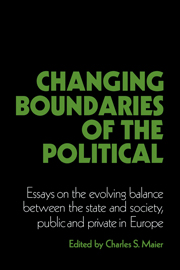 Changing Boundaries of the Political
Changing Boundaries of the Political Introduction
Published online by Cambridge University Press: 05 June 2012
Summary
The chapters in this volume are the results of the second research cycle of the Joint Committee on Western Europe of the Social Science Research Council and the American Council of Learned Societies. A first volume of papers, published in 1981 as Organizing Interests in Western Europe, examined the changing structures of representation and interest intermediation. Collectively, as Suzanne Berger explained in her introduction, those essays argued for a model of the relationship between state and civil society that significantly departed from the paradigms of American social science in the 1950s and 1960s. Whereas this earlier work described a system of decentralized competitive pluralism, the contributions to Organizing Interests suggested that policy emerged from a more restrictive collaboration of state agencies and large producer interests. The authors explored the growth, the patterns, and – just as significant – the limits of what is often termed “corporatism”.
The contributions to this second volume take up a theme that is an outgrowth of our earlier work. Beyond the issue of the representation of interests and opinions lies that of the claims of politics in general. When the then members of the Joint Committee on Western Europe framed this inquiry, they were acutely aware that the agendas of political discussion in Western Europe and other industrial countries had become crowded with issues that had not been subjects of controversy for many years. These intrusive issues included questions of family and sexual relationships, of environmental degradation, fundamental dilemmas of national security and sovereignty, and the heightened perception of economic vulnerability.
- Type
- Chapter
- Information
- Changing Boundaries of the PoliticalEssays on the Evolving Balance between the State and Society, Public and Private in Europe, pp. 1 - 24Publisher: Cambridge University PressPrint publication year: 1987
- 2
- Cited by
